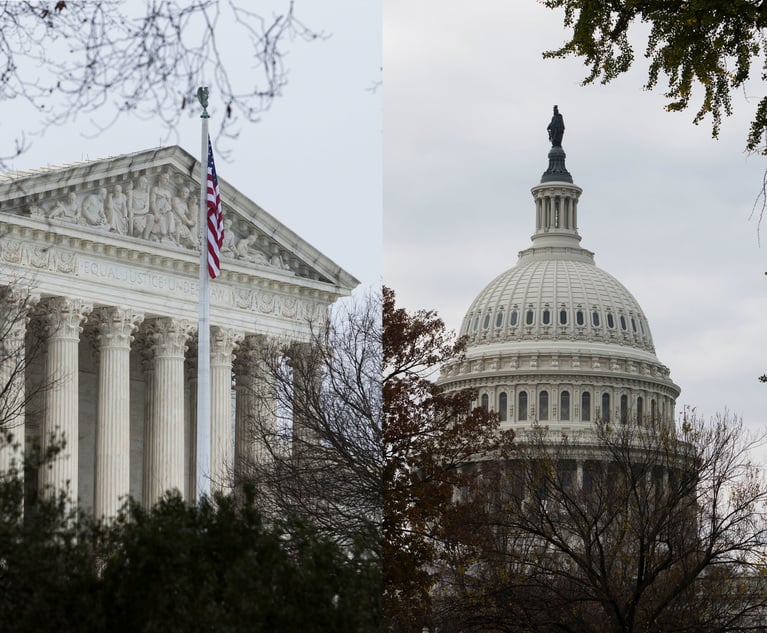 Gregory L. Diskant, of Patterson, Belknap, Webb & Tyler, and David A. Schulz, of Ballard Spahr. Courtesy photos
Gregory L. Diskant, of Patterson, Belknap, Webb & Tyler, and David A. Schulz, of Ballard Spahr. Courtesy photos We Need a Binding and Enforceable Supreme Court Ethics Code
The Court's Code of Conduct reflects the approach of an "imperial court." It fails fully to comply with existing law and does not safeguard against the appearance of bias. It is high time for Congress to step in.
October 25, 2024 at 08:00 AM
8 minute read
In a much-discussed Harvard Law Review article, Stanford Law professor Mark A. Lemley lamented that the newly empowered Roberts Court has become an "imperial Supreme Court," repeatedly using its decisions to arrogate power to the court itself. Based on our review, the U.S. Supreme Court's recently adopted Code of Conduct displays this same "imperial" attitude with respect to ethical issues, eliding ethical mandates that apply to all other judges and seemingly placing the justices beyond the law. For the sake of our judicial system, it is time for Congress to act.
Impartial justice and the appearance of impartial justice are critical to public confidence in our courts. That is why there have been calls for many years for the Supreme Court to enact mandatory and enforceable ethics rules for itself, like those that govern all lower federal courts and the state courts in all 50 states. It took the intense public pressure created by news reports revealing lavish gifts showered on Justice Clarence Thomas and undisclosed luxury vacations provided to Thomas and Justice Samuel Alito to finally move the court to act last year. Unfortunately, the Supreme Court's new Code of Conduct falls short. Its standards are neither mandatory nor enforceable and some, disturbingly, conflict with obligations expressly imposed on the justices by existing federal law.
NOT FOR REPRINT
© 2025 ALM Global, LLC, All Rights Reserved. Request academic re-use from www.copyright.com. All other uses, submit a request to [email protected]. For more information visit Asset & Logo Licensing.
You Might Like
View All
American Bar Association Calls for Enforceable Supreme Court Ethics Code

Roberts Calls Court's Relationship With Congress 'Strained.' Who's to Blame?

Judicial Conference Declines Democratic Request to Refer Justice Thomas to DOJ

Senate Judiciary Dems Release Report on Supreme Court Ethics
Law Firms Mentioned
Trending Stories
- 1How Alzheimer’s and Other Cognitive Diseases Affect Guardianship, POAs and Estate Planning
- 2How Lower Courts Are Interpreting Justices' Decision in 'Muldrow v. City of St. Louis'
- 3Phantom Income/Retained Earnings and the Potential for Inflated Support
- 4Should a Financially Dependent Child Who Rejects One Parent Still Be Emancipated?
- 5Advising Clients on Special Needs Trusts
Who Got The Work
J. Brugh Lower of Gibbons has entered an appearance for industrial equipment supplier Devco Corporation in a pending trademark infringement lawsuit. The suit, accusing the defendant of selling knock-off Graco products, was filed Dec. 18 in New Jersey District Court by Rivkin Radler on behalf of Graco Inc. and Graco Minnesota. The case, assigned to U.S. District Judge Zahid N. Quraishi, is 3:24-cv-11294, Graco Inc. et al v. Devco Corporation.
Who Got The Work
Rebecca Maller-Stein and Kent A. Yalowitz of Arnold & Porter Kaye Scholer have entered their appearances for Hanaco Venture Capital and its executives, Lior Prosor and David Frankel, in a pending securities lawsuit. The action, filed on Dec. 24 in New York Southern District Court by Zell, Aron & Co. on behalf of Goldeneye Advisors, accuses the defendants of negligently and fraudulently managing the plaintiff's $1 million investment. The case, assigned to U.S. District Judge Vernon S. Broderick, is 1:24-cv-09918, Goldeneye Advisors, LLC v. Hanaco Venture Capital, Ltd. et al.
Who Got The Work
Attorneys from A&O Shearman has stepped in as defense counsel for Toronto-Dominion Bank and other defendants in a pending securities class action. The suit, filed Dec. 11 in New York Southern District Court by Bleichmar Fonti & Auld, accuses the defendants of concealing the bank's 'pervasive' deficiencies in regards to its compliance with the Bank Secrecy Act and the quality of its anti-money laundering controls. The case, assigned to U.S. District Judge Arun Subramanian, is 1:24-cv-09445, Gonzalez v. The Toronto-Dominion Bank et al.
Who Got The Work
Crown Castle International, a Pennsylvania company providing shared communications infrastructure, has turned to Luke D. Wolf of Gordon Rees Scully Mansukhani to fend off a pending breach-of-contract lawsuit. The court action, filed Nov. 25 in Michigan Eastern District Court by Hooper Hathaway PC on behalf of The Town Residences LLC, accuses Crown Castle of failing to transfer approximately $30,000 in utility payments from T-Mobile in breach of a roof-top lease and assignment agreement. The case, assigned to U.S. District Judge Susan K. Declercq, is 2:24-cv-13131, The Town Residences LLC v. T-Mobile US, Inc. et al.
Who Got The Work
Wilfred P. Coronato and Daniel M. Schwartz of McCarter & English have stepped in as defense counsel to Electrolux Home Products Inc. in a pending product liability lawsuit. The court action, filed Nov. 26 in New York Eastern District Court by Poulos Lopiccolo PC and Nagel Rice LLP on behalf of David Stern, alleges that the defendant's refrigerators’ drawers and shelving repeatedly break and fall apart within months after purchase. The case, assigned to U.S. District Judge Joan M. Azrack, is 2:24-cv-08204, Stern v. Electrolux Home Products, Inc.
Featured Firms
Law Offices of Gary Martin Hays & Associates, P.C.
(470) 294-1674
Law Offices of Mark E. Salomone
(857) 444-6468
Smith & Hassler
(713) 739-1250








